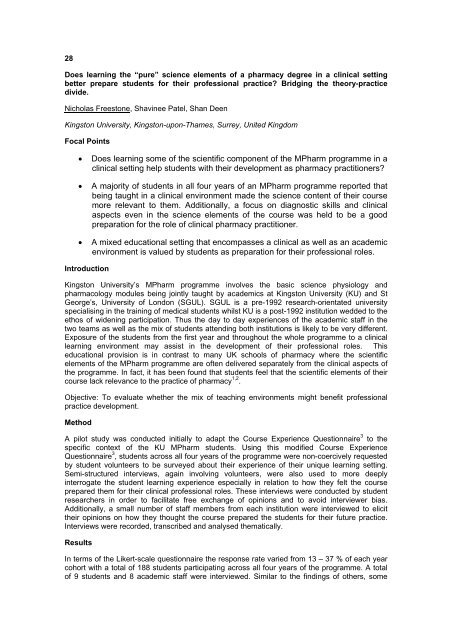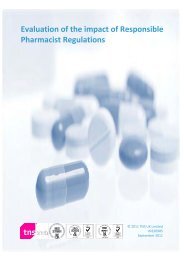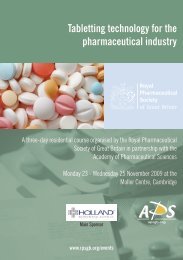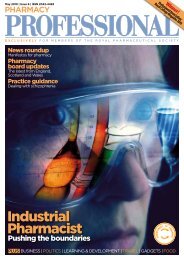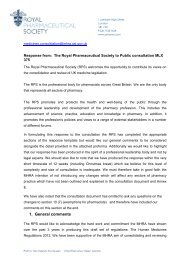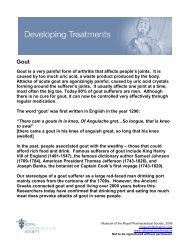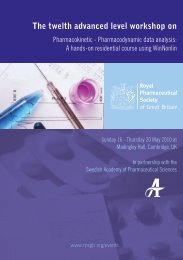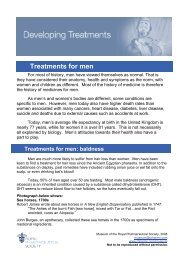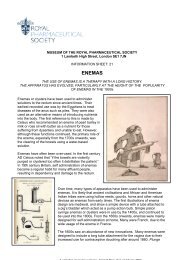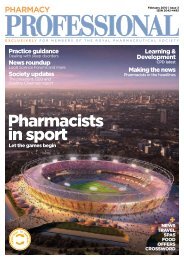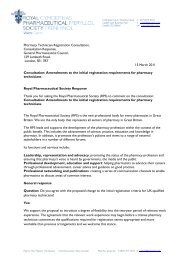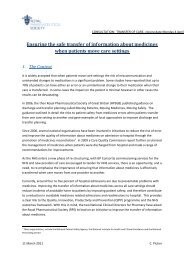RPS Conference 2010, Abstracts 2010 - Royal Pharmaceutical Society
RPS Conference 2010, Abstracts 2010 - Royal Pharmaceutical Society
RPS Conference 2010, Abstracts 2010 - Royal Pharmaceutical Society
You also want an ePaper? Increase the reach of your titles
YUMPU automatically turns print PDFs into web optimized ePapers that Google loves.
28<br />
Does learning the “pure” science elements of a pharmacy degree in a clinical setting<br />
better prepare students for their professional practice? Bridging the theory-practice<br />
divide.<br />
Nicholas Freestone, Shavinee Patel, Shan Deen<br />
Kingston University, Kingston-upon-Thames, Surrey, United Kingdom<br />
Focal Points<br />
• Does learning some of the scientific component of the MPharm programme in a<br />
clinical setting help students with their development as pharmacy practitioners?<br />
• A majority of students in all four years of an MPharm programme reported that<br />
being taught in a clinical environment made the science content of their course<br />
more relevant to them. Additionally, a focus on diagnostic skills and clinical<br />
aspects even in the science elements of the course was held to be a good<br />
preparation for the role of clinical pharmacy practitioner.<br />
• A mixed educational setting that encompasses a clinical as well as an academic<br />
environment is valued by students as preparation for their professional roles.<br />
Introduction<br />
Kingston University’s MPharm programme involves the basic science physiology and<br />
pharmacology modules being jointly taught by academics at Kingston University (KU) and St<br />
George’s, University of London (SGUL). SGUL is a pre-1992 research-orientated university<br />
specialising in the training of medical students whilst KU is a post-1992 institution wedded to the<br />
ethos of widening participation. Thus the day to day experiences of the academic staff in the<br />
two teams as well as the mix of students attending both institutions is likely to be very different.<br />
Exposure of the students from the first year and throughout the whole programme to a clinical<br />
learning environment may assist in the development of their professional roles. This<br />
educational provision is in contrast to many UK schools of pharmacy where the scientific<br />
elements of the MPharm programme are often delivered separately from the clinical aspects of<br />
the programme. In fact, it has been found that students feel that the scientific elements of their<br />
course lack relevance to the practice of pharmacy 1,2 .<br />
Objective: To evaluate whether the mix of teaching environments might benefit professional<br />
practice development.<br />
Method<br />
A pilot study was conducted initially to adapt the Course Experience Questionnaire 3 to the<br />
specific context of the KU MPharm students. Using this modified Course Experience<br />
Questionnaire 3 , students across all four years of the programme were non-coercively requested<br />
by student volunteers to be surveyed about their experience of their unique learning setting.<br />
Semi-structured interviews, again involving volunteers, were also used to more deeply<br />
interrogate the student learning experience especially in relation to how they felt the course<br />
prepared them for their clinical professional roles. These interviews were conducted by student<br />
researchers in order to facilitate free exchange of opinions and to avoid interviewer bias.<br />
Additionally, a small number of staff members from each institution were interviewed to elicit<br />
their opinions on how they thought the course prepared the students for their future practice.<br />
Interviews were recorded, transcribed and analysed thematically.<br />
Results<br />
In terms of the Likert-scale questionnaire the response rate varied from 13 – 37 % of each year<br />
cohort with a total of 188 students participating across all four years of the programme. A total<br />
of 9 students and 8 academic staff were interviewed. Similar to the findings of others, some


